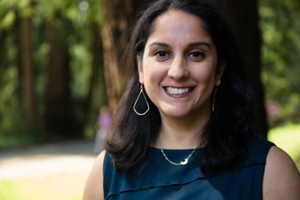Rachel Carson College Faculty Fellows

Sikina Jinnah is Rachel Carson College's new faculty chair!
The Chair of the Faculty is an Academic Senate member, other than the Provost, who is elected by the college Faculty to serve a two year term, and will serve as a member of the Executive Committee.
Dr. Jinnah is an Associate Professor in the Politics Department, an affiliated faculty member in the Environmental Studies Department, and a 2017 Andrew Carnegie Fellow. Her research focuses on the shifting locations of power and influence in global environmental governance, and in particular the role of transnational actors in environmental decision-making. Her most recent projects examine how key norms in global climate politics shape power relations, the role of U.S. preferential trade agreements in shaping environmental policy in trading partner nations, and the politics of climate engineering governance.

- Title
- Distinguished Professor
- Division Physical & Biological Sciences Division
- Department
- Mathematics Department
- Phone 831-459-2150
- Fax 831-459-4511
- Website
- Office Location
- McHenry Library, McHenry Building #4157
- Mail Stop Mathematics Department
- Mailing Address
- 1156 High Street
- Santa Cruz CA 95064
Research Interests
Professor Cooperstein’s research covers several areas related to groups of Lie type, finite group theory, Galois geometry and, more generally, incidence geometry. By incidence geometry is meant a pair (P,L) consisting of a set P whose members are called points, and a collection L of distinguished subsets of P whose members are called lines. Projective planes (more generally projective space) and generalized quadrangles are examples. Recently he has become interested in the “embeddings” of such geometries - ways in which these geometries can be modeled by point sets in projective space together with some full projective lines. In particular, he is interested in finding the largest - universal - such embeddings and has achieved results for many of the Lie incidence geometries.
A related problem that interests Professor Cooperstein concerns characterizing the maximal external subspaces which do not contain any points of various point sets in finite projective space - so called maximal external flats. Such spaces can be used to construct caps on varieties, error-correcting codes, and other combinatorial objects. Another problem which animates Cooperstein’s interest is the possible non-existence of ovoids on hyperbolic quadric in ten (linear dimensions). Another problem that he has undertaken is the characterization of apartments in the shadow geometries of spherical buildings.
Biography, Education and Training
B.A. Queens College, City University of New York
M.A., Ph.D., University of Michigan
Selected Publications
- B. Cooperstein: (With A. Cohen): Lie Incidence Systems viewed as Intersections of Quadrics. Proceedings of the American Mathematical Society, volume 126, number 7 (July 1998), 2095-2102.
- B. Cooperstein: On a Connection Between Hyperbolic Ovoids on the Hyperbolic Quadric Q (10,q) and the Lie Incidence Geometry E6,1(q), 55-64 in Groups and Geometries, Birkhauser, 1998.
- B. Cooperstein: On the Generation of Dual Polar Spaces of Unitary Type Over Finite Fields. European Journal of Combinatorics 18 (1997), no.8, 849-856.
- B. Cooperstein: External Flats to Varieties in PG(Mn,n(GF(q)). Linear Algebra and Its Applications, 267 (1997), 175-186.
- B. Cooperstein: On the Generation of Some Dual Near Polygons of Symplectic Type Over GF(2). European Journal of Combinatorics 18 (1997), no. 7, 741-749.
